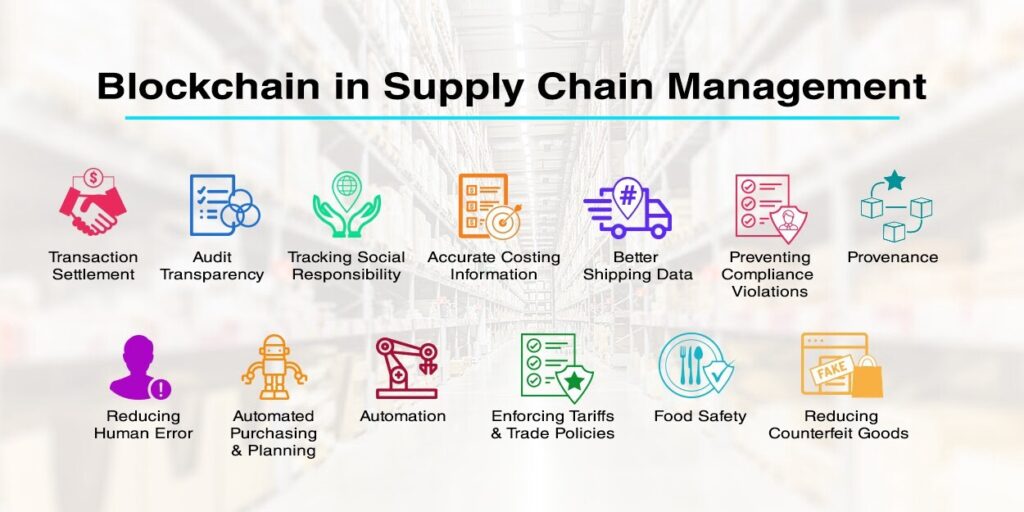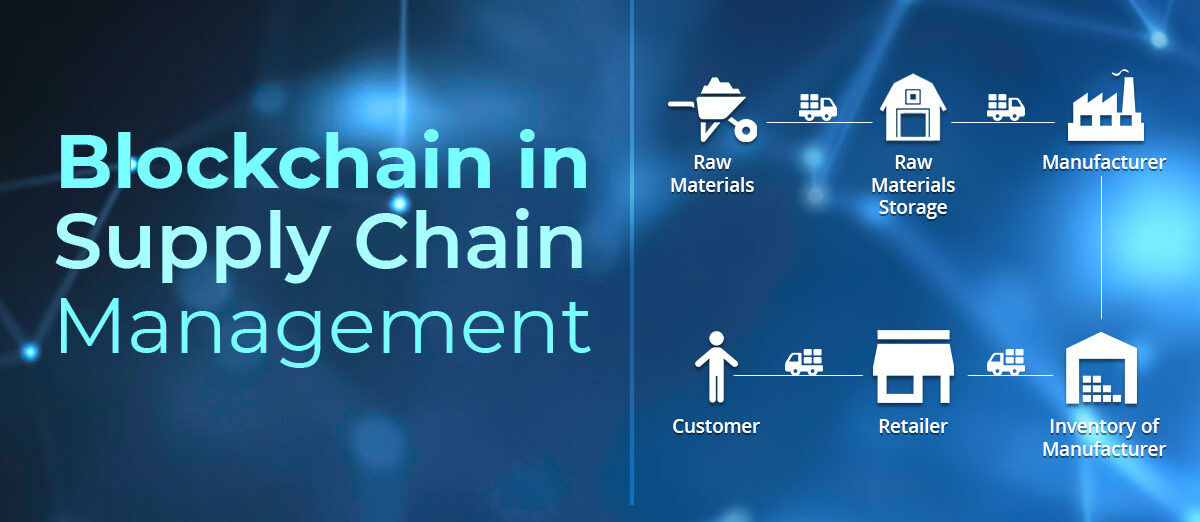The Role of Blockchain in Supply Chain
- 1 The Role of Blockchain in Supply Chain
- 1.1 Learning Blockchain
- 1.2 Benefits of Blockchain Systems in Supply Chain
- 1.3 Real-time visibility & Reporting
- 1.4 Transparency & Trust
- 1.5 Authentication & Differential Check
- 1.6 Billing & Payment
- 1.7 Freight & Delivery
- 1.8 Real-World Applications of Blockchain in Supply Chain
- 1.9 A Few Applications to Evaluate
- 2 Conclusion
It is a Transparent Potential for the creation of blockchain in supply chain technology. Blockchain is the digital record-keeping technology behind cryptocurrency networks like Bitcoin. It evolved as a potential game-changer for economic benefits and additional industrial areas, such as healthcare, automotive, governance, retail and customer goods, manufacturing, supply chain, etc. Today, we choose to look at the application of blockchain in supply chain technology.
The blockchain in the supply chain can make traceability, product delivery, coordination between partners, and financial aid access more cost-efficient and rapid.
The Role of Blockchain in Supply Chain

Learning Blockchain
Blockchain is a cloud-based digital log or document of data with a transferred database that offers real-time commerce and documented modifications to the archives. The data or knowledge is stored in a safe, supportable chain of blocks. In expansion, the libraries themselves can be programmed to trigger transactions automatically. As a result, blockchain will allow a limited number of known parties to protect their business from malicious activities while improving implementation in the supply chain.
In disposition, blockchain has two prevailing types: Permission-less dispersed logs, such as Bitcoin, and Permission-ed centralized catalogues managed by nodes and benefits outside the general territory. Excellence in blockchain technology delivers critical developments in the supply chain.
Benefits of Blockchain Systems in Supply Chain
Blockchain is a revolutionary technology that is transforming different enterprises’ business operations, economizing, and logistics; there is no anomaly. So, it allows us to encounter the way blockchain is extending supply chain administration.
Real-time visibility & Reporting
The primary pitfall in supply chain management is implementation blunders. Regardless, immaculate record-keeping in blockchain can save a company from that. Whether updating schedules or correcting provided information, blockchain offers an identifying element in every step of the supply chain so that the mistakes become visible at the initial stages and can be easily adjusted as necessary.
Transparency & Trust
Blockchain helps create a remarkable record for each transaction in a supply chain. This ledger allows supply chain managers to immediately see the transactional history between suppliers and merchants. In addition, it assists in eliminating random places from conventional document keeping while delivering enhanced clarity to enhance coordination among groups.
Rather than inspecting the cargo position with the distributor, the log can deliver an active communication permit. In essence, blockchain registers cannot be changed or deleted. These catalogues document ever-changing and require a comprehensive understanding to complete these changes within the network. When the object is removed from the roster, you intend to get the details on when it has been deleted or removed by another.
Authentication & Differential Check
Blockchain authorizes tracing goods’ origin from an intermediate or storekeeper to a typical manufacturer. Separate clusters of goods are provided with a label to secure data reality. These labels observe the good’s establishment and relations with supply chain groups to sustain differentiation checks.
Billing & Payment
Shipping freight from one place to another makes a supply chain that can be a challenging task to manage. It concerns up to 30 communities that transmit messages to each other for several moments. These exchanges usually connect to payment and billing. The trades using the traditional system are involved. They swallow a lot of time and effort, resulting in deception, manipulation, and numerous errors. However, the usage of blockchain in the supply chain allows automated invoicing and payment by relating computations to the implementation of detailed measures.
Similarly, blockchain benefits the supply chain by decreasing the need for paperwork or arbitrators, eradicating errors, controlling fraud, assuring precision and observation in economic computations, timing, and assembling operations quickly.
Freight & Delivery
Blockchain’s shrewd assurance in the supply chain can efficiently save the logistics enterprise from bloated spending. These imaginative arrangements computerize the company processes and workflow. The dispersed blockchain log will help decrease the delivery period. It will also glimpse phoney and decline misconceptions.
Real-World Applications of Blockchain in Supply Chain
Comprehending the benefits of blockchain might help us know about the application of blockchain in real-world supply chains.
Providing the virtuous origin of the diamond is not so easy. It is easy to outline them from mining and handoffs from their supply chain. Luminous Earth is chasing the source of diamonds via the Everledger blockchain. They have incorporated blockchain technology into their supply chain to pursue the diamond head securely. It also offers marker commitment to the client. Blockchain will enable the following documentation: statements and certificates. Again, it will securely hold the chain of possession data in the supply chain.
A Few Applications to Evaluate
IBM and Maersk are working on cross-party, cross-border trades applying blockchain to enhance the efficiency of the operation.
TagltSmart and OriginTrail desire to track wine bottles’ lawfulness utilizing blockchain technology for clarity and QR codes positioned on each bottle with pieces.
The blockchain of pallet pooling is the most unique technology. Pallet pooling management outsourcing is essential to supply chain detachments as a spine of logistics and supply chain shiftings. Simultaneously, several regulations, criteria, and functioning conditions are evaluated in daily processes. In recent years, pallet pooling has been unconventionally championed to address pallets in a closed-loop procedure to improve sustainability and functioning significance. Altogether, this analysis regularizes decentralized pallet management in the closed-loop instrument, resulting in a formative blow on bearable consequences in the logistics ambition.
Conclusion
Yet, the pallet pool knowledge procedure, which is the foundation for pallet sharing and controls the core pallet business, oversees necessary problems, such as problems in pallet marketing through different communication platforms. Such problems will direct the growth of pallet pooling. Because of the overhead issues, first, a resolution is put forward to satisfy pallet interaction among additional venues and lessors using blockchain technology. An additional efficient pallet pooling logistics relations procedure is suggested.

















